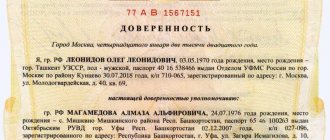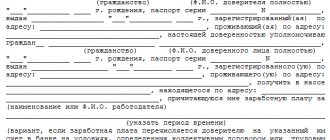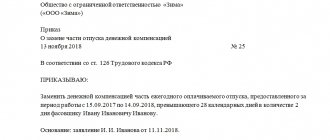A power of attorney for the right to represent interests is a written order by which the principal transfers his own powers to the representative. In this article you will find a power of attorney to represent the interests of a legal entity (sample) along with the procedure for drawing up and revoking this document.
Transfer of managerial powers
A legal entity participates in civil, tax and public relations through an approved manager. It acts only on the basis of the charter or an order of appointment, but if it is necessary to transfer some of the director’s rights to the representative, a special document is drawn up for this purpose.
A company representative does not have to be an employee, but this rule has been in effect for a short time. Until 2012, Instruction of the USSR Ministry of Finance dated January 14, 1967 No. 17 prohibited the issuance of powers of attorney to persons not working in this organization. Now the Instruction has been canceled along with this requirement, so any citizen has the right to be a representative of an LLC.
The Civil Code does not divide powers of attorney by type, but in business transactions they are still distinguished:
- General or general - issued for the widest possible range of rights, does not specify the types of transactions or third parties before whom the representative has the right to act on behalf of the principal.
- Special – gives the right to perform an unlimited number of similar actions or transactions (for example, to represent the interests of an enterprise only in judicial or tax authorities).
- One-time – for one specific transaction or action (for example, for a one-time receipt of goods from a supplier).
Read more: Power of attorney to the tax office to represent the interests of a legal entity
Next we will look at how a general power of attorney is issued to represent the interests of a legal entity.

Power of attorney forms
All proposed power of attorney forms are valid in 2021 and are available for free download in the following formats: PDF - for manual filling, as well as Word (docx) - for manual filling and entering data from a PC keyboard.
Files with the PDF extension can be opened and printed using browsers: Chrome, Explorer, Edge, etc., as well as using programs: Acrobat Reader, PDF-XChange Viewer, PDF Viewer Plus, Soda PDF, etc., which can be found and downloaded for free on the Internet.
Power of attorney to drive a car (vehicle)
The form is filled out and certified by the owner of the vehicle (an individual) without a notary to transfer the following powers to his representative:
- driving license,
- passing technical inspection,
- receiving a vehicle from a parking lot,
- registration of an MTPL policy,
- representing the interests of the owner in the traffic police,
- handling the case in court after an accident.
The maximum validity period of a power of attorney is three years (36 months).
Sample power of attorney form for a car
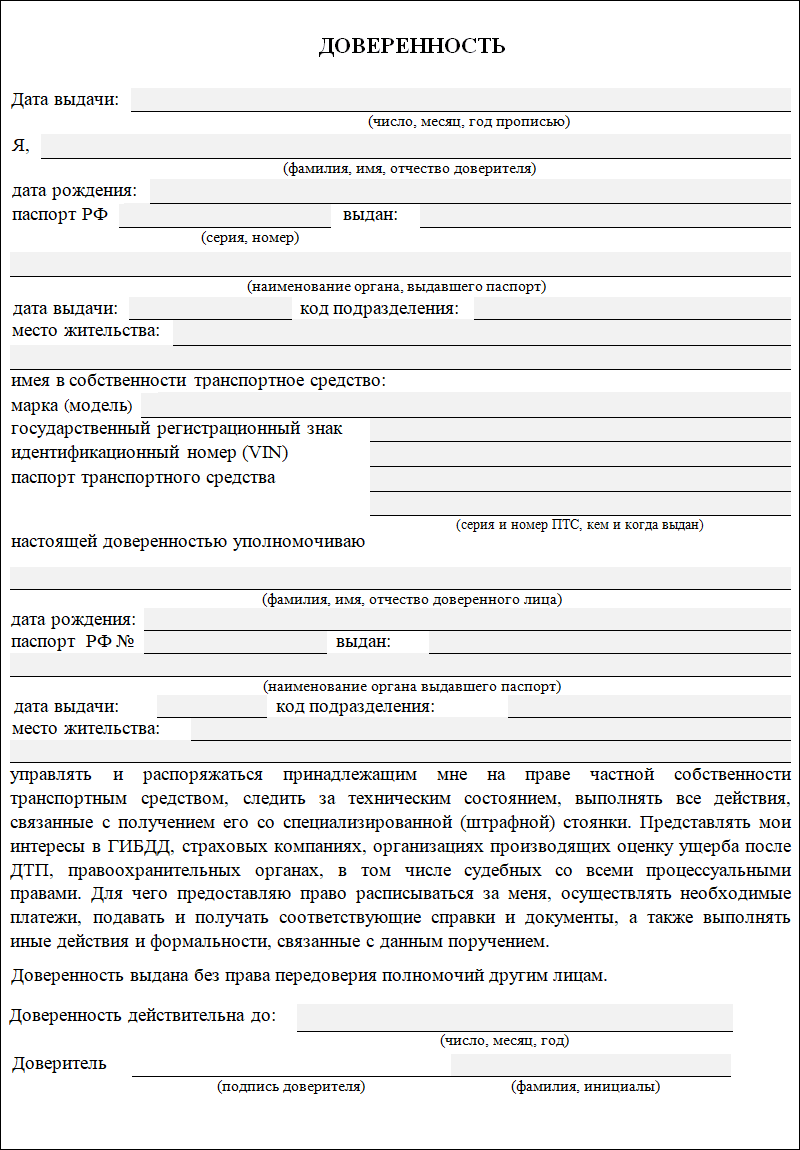
Power of attorney for vehicle registration
A power of attorney form for registering a car (vehicle) with the State Traffic Safety Inspectorate and obtaining state license plates is filled out and certified by the owner of the vehicle (an individual) without a notary to transfer authority to his representative. This power of attorney form includes fields for filling out the data of the purchase and sale agreement, so it is advisable to use it after purchasing a vehicle.
The validity period of the power of attorney cannot exceed one year (12 months). The document is printed in 2 copies: one for submission to the traffic police, the second for the representative of the vehicle owner.
Sample form of power of attorney for vehicle registration
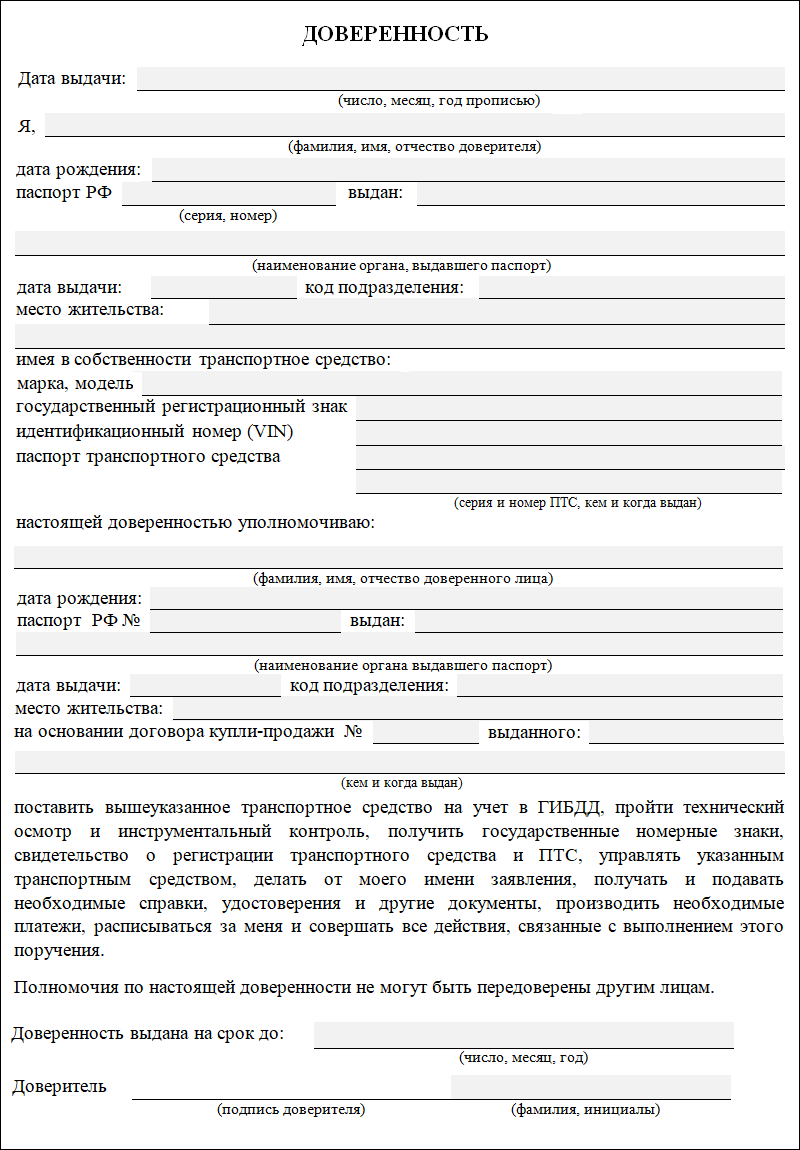
Power of attorney to perform registration actions
A power of attorney form for any registration actions with the traffic police with a vehicle (does not include fields with the data of the purchase and sale agreement) - filled out and certified by the owner of the vehicle (an individual) without a notary to transfer the following powers to his representative:
- driving license,
- car registration license,
- obtaining a registration certificate and PTS,
- obtaining state license plates,
- changes in registration data,
- termination of registration,
- registration and deregistration,
- appeals against non-fulfillment or improper performance of official duties by officials.
The validity period of the power of attorney cannot exceed one year (12 months). The document is printed in 2 copies: one for submission to the traffic police, the second for the representative of the vehicle owner.
Sample form of power of attorney to perform registration actions in the traffic police
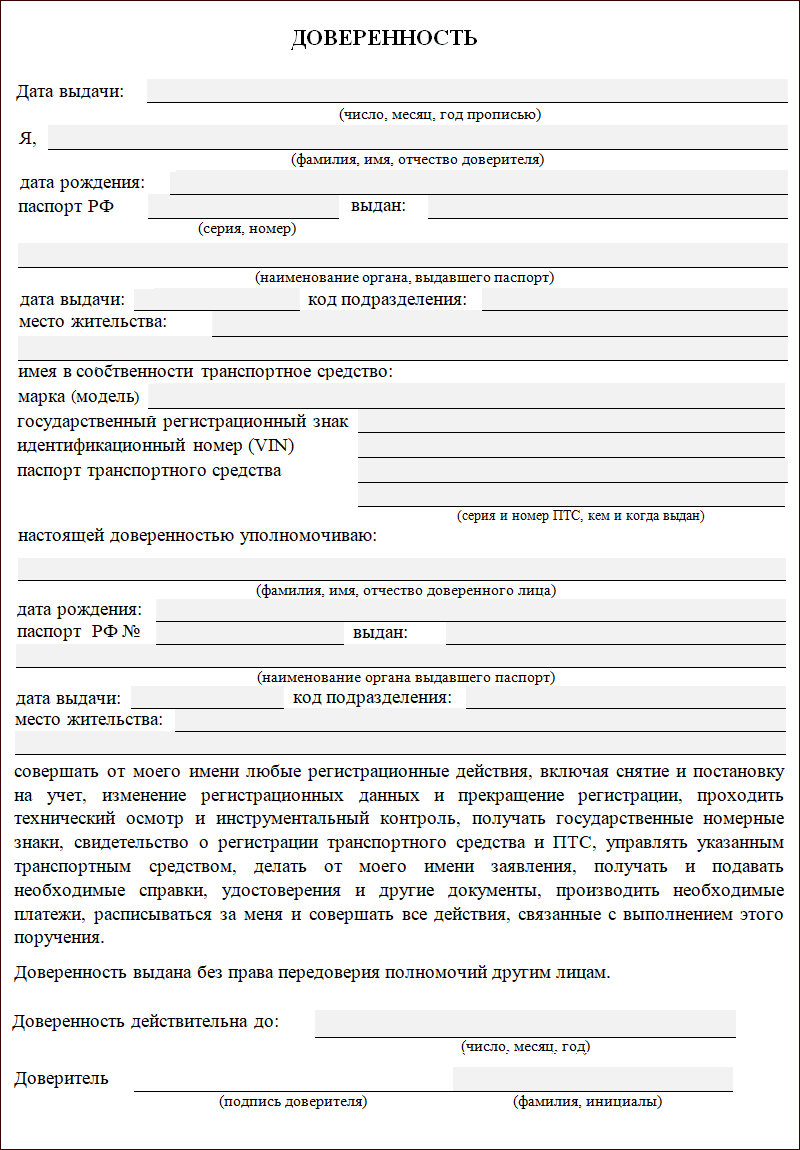
Contents of the power of attorney
The legal basis for the transfer of powers is specified in Articles 185-189 of the Civil Code of the Russian Federation. The text of the power of attorney to represent the interests of a legal entity must contain the following information:
- full name and legal form of the principal (LLC, JSC);
- date of issue (if absent, the document is considered invalid);
- validity period (if it is not specified, then the document is valid for one year from the date of preparation);
- TIN, KPP, OGRN codes of the organization;
- full name of the manager;
- full name and passport details of the representative;
- a detailed description of the rights being transferred;
- sample signature of the representative;
- signature of the manager or other authorized person.
Additionally, you can specify the condition on the right of sub-assignment and the procedure for exercising powers if there are several such persons.
A general power of attorney to represent the interests of a legal entity conveys the total scope of powers, therefore they are described in general terms, without being specific, for example, like this:
- manage and dispose of the company’s property, with the exception of transactions within the competence of the general meeting of participants;
- represent the company in all state and municipal bodies, institutions, organizations, in organizations of any organizational and legal forms and forms of ownership and in front of any individuals;
- conduct in the interests and on behalf of society any administrative and civil cases in all judicial bodies with all procedural rights and actions;
- on behalf and in the interests of the principal, send and receive any incoming and outgoing correspondence;
- manage cash and non-cash funds of the LLC;
- perform any other legal and actual actions not expressly specified to carry out this instruction.
A power of attorney to represent the interests of a legal entity (general) is drawn up in writing and certified by the signature of the director. The LLC seal is no longer recognized as a mandatory attribute for certifying business papers, but in practice it continues to be used.
But, there are a number of situations when the transfer of authority is formalized by a notary. All of them are listed in Article 185.1 of the Civil Code of the Russian Federation:
- carrying out transactions for which the law provides for a notarial form;
- filing applications for state registration of rights or transactions;
- disposal of rights registered in state registers.
Thus, if transactions or actions not included in this list are carried out under a general power of attorney, then a simple written form is sufficient.

Contents of the document
The content of the power of attorney depends on its type. But, as a rule, the document contains these details:
- Date of issue of the document. From this time the validity period of the document is counted.
- Information about the principal. Full name, date of birth, passport details.
- Representative information. Full name and passport details.
- The powers vested in the representative.
- Representative signature sample.
- Validity period of the document.
- Signature of the principal.
Sometimes the document indicates the possibility of reassignment. Involves the transfer of powers from one representative to another.
Is the power of attorney terminated after the director’s dismissal?
A common situation is that the previous director is fired, and the new director is not even aware that the interests of the company continue to be represented by persons unknown to him. It is important to know that the power of attorney does not automatically terminate with the dismissal or death of the director. The fact is that the manager issued the document not on his own behalf, but on behalf of a legal entity that continues to operate.
All grounds for termination of a power of attorney are given in Article 188 of the Civil Code of the Russian Federation, and among them there is no such reason as the loss of official powers by the head. In order to avoid getting into the unpleasant situation of concluding transactions that the current director does not approve of, the power of attorney can be revoked. To do this, the organization must maintain a register of documents issued to confirm the powers of trustees, indicating the period of issue and the scope of rights.
Please note: if another employee is fired, for example, an accountant, lawyer, clerk, to whom a power of attorney was issued, then it also continues to be valid. Do not forget to revoke the granted authority when dismissing such an employee.
Powers of attorney of parents, adoptive parents and guardians on behalf of minors and incapacitated persons
Part 1 art. 28 of the Code states that transactions for children under 14 years of age are concluded by their legal representatives.
At the same time, part 2 of Art. 28 of the Code makes an exception for the types of transactions that children from 6 to 14 years old can carry out independently.
The list of persons entitled to enter into transactions for minors is closed:
- guardians;
- adoptive parents;
- parents.
Other persons are not entitled to carry out transactions on behalf of minors.
However, the law does not prohibit the exercise of the corresponding powers of the above-mentioned persons through representatives. Thus, parents, adoptive parents and guardians have the right to draw up and issue powers of attorney to conclude any transactions on behalf of minors.
Transactions on behalf of the incapacitated person are carried out by a guardian. A person limited by the court in legal capacity can independently issue a power of attorney only for the implementation of small household transactions, and for the rest - only with the consent of the trustee.
Revocation of power of attorney
If for some reason a legal entity withdraws a representative, you must:
- Notify the representative in writing of the termination of his powers and demand the return of the issued document.
- Notify the persons for whom a power of attorney was issued for representation of the termination of the representative’s powers.
Unfortunately, the law does not provide an interpretation of what to do if the representative does not return the document or it is lost. In this case, it is especially important to publicly notify third parties that the trustee's authority has been revoked. To do this, you need to submit an advertisement in the Kommersant newspaper. At the end of one month, third parties are considered to have been notified of this fact.
Powers and brief description of types of Powers of Attorney
So, having familiarized yourself with the concept, general provisions, and types of powers of attorney, you can move on to the Powers that can be enshrined in the Power of Attorney.
Powers can be divided into two types:
- Exclusive (powers are exclusive if they must be specifically spelled out verbatim in accordance with the rule of law. If this requirement is not met and the text is not specified, then the trustee will not have the right to exercise these powers)
- General (a set of powers that an authorized person can exercise without special verbatim reinforcement; it is enough to indicate the general text and a link to the rule of law)
The main question is: where and for what cases is it necessary to issue a power of attorney?
The most important thing is that the powers are legal and do not go beyond the legislation of the Russian Federation.
To give as wide a list of powers as possible, we will build on the above classification of powers of attorney, it follows from this:
Banking power of attorney.
A banking power of attorney is issued by both individuals and legal entities; of course, most often the need to draw up such a power of attorney arises among legal entities. Such a power of attorney can be either intra-bank (i.e. executed by the bank itself) or notarized. It can be either one-time or long-term.
Postal power of attorney.
This type of power of attorney is issued to a person to receive mail. Such a power of attorney can be issued by both individuals and legal entities. It can be either one-time or long-term. If a power of attorney is issued by an individual, then this power of attorney must be notarized.
Judicial power of attorney.
Judicial - to represent interests in court in civil cases, criminal cases, administrative cases, in cases considered by the arbitration court.
Alas, in our time no one is immune from such a procedure as a trial. Since many people do not have sufficient knowledge, they turn to specialists in this field.
In order for the Representative to represent the interests of the Principal in court, a power of attorney is drawn up:
— on behalf of an individual, the power of attorney must be notarized, or equivalent to it:
Spoiler
Civil Code of the Russian Federation Article 185.1. Power of attorney
- The following are equivalent to notarized powers of attorney:
1) powers of attorney of military personnel and other persons undergoing treatment in hospitals, sanatoriums and other military medical institutions, which are certified by the head of such an institution, his deputy for medical affairs, and in their absence, the senior or duty doctor;
2) powers of attorney of military personnel, and at points of deployment of military units, formations, institutions and military educational institutions, where there are no notary offices and other bodies performing notarial acts, also powers of attorney of employees, members of their families and family members of military personnel, which are certified by the commander (chief ) these units, formations, institutions or establishments;
3) powers of attorney of persons in places of deprivation of liberty, which are certified by the head of the corresponding place of deprivation of liberty;
4) powers of attorney of adult capable citizens located in social protection institutions, which are certified by the administration of this institution or the head (his deputy) of the relevant social protection authority.
— on behalf of a legal entity, a power of attorney is issued signed by its head or another person authorized to do so in accordance with the law and constituent documents.
This power of attorney has the same qualities as the previous ones. However, the powers that are enshrined in it are best formalized through a table.
| General powers for civil, arbitration administrative proceedings: (Article 35 of the Code of Civil Procedure of the Russian Federation, Article 41 of the Arbitration Procedure Code of the Russian Federation, Article 45 of the CAS of the Russian Federation) |
|
| Exclusive powers |
| Civil proceedings (Article 54 of the Code of Civil Procedure of the Russian Federation) |
|
| Arbitration procedural proceedings (Article 62 of the Arbitration Procedure Code of the Russian Federation) |
|
| Administrative proceedings (Article 56 CAS RF) |
In administrative proceedings, an administrative claim is filed.
|
| General powers for a person against whom proceedings are being conducted for an administrative offense and the victim (Article 25.1 and Article 25.2 of the Code of Administrative Offenses of the Russian Federation) |
|
| Exclusive powers of the defender and representative (25.5 Code of Administrative Offenses of the Russian Federation) |
|
Separately, it is necessary to consider the powers in criminal proceedings, since in these proceedings there is a plurality of persons participating in it.
Firstly, the persons who may have a representative on the prosecution side are:
- victim;
- civil plaintiff;
- private prosecutor.
Secondly, persons who may have a representative on the defense side are:
- suspect;
- accused;
- civil defendant.
For each of the listed persons, there are separate rights that they can exercise during criminal proceedings, and depending on who the Principal is, the general and exclusive powers of the Representative should be considered.
| General powers for a person against whom proceedings are being conducted for an administrative offense and the victim (Article 25.1 and Article 25.2 of the Code of Administrative Offenses of the Russian Federation) |
|
| Exclusive powers of the defender and representative (25.5 Code of Administrative Offenses of the Russian Federation) |
|
| General powers: for the victim, civil plaintiff, suspect, accused, civil defendant (Articles 42,44, 46, 47, 54 of the Code of Criminal Procedure of the Russian Federation) |
|
| Exclusive powers |
| For the victim (Article 42 of the Code of Criminal Procedure of the Russian Federation) |
|
| For a civil plaintiff (Article 44 of the Code of Criminal Procedure of the Russian Federation) |
A civil plaintiff brings a civil claim.
|
| For the defense (suspect, accused) (Article 46, Article 47, Article 53 of the Code of Criminal Procedure of the Russian Federation) |
|
| For a civil defendant (Article 54 of the Code of Criminal Procedure of the Russian Federation) |
|
It should be noted that there are several stages of criminal proceedings and at each of them, the representative, as well as the participants in the criminal process themselves, can exercise a certain amount of rights. For example, at the stage of the preliminary investigation, no one can get acquainted with the case materials, make extracts from them, or make copies, only after its completion.
Power of attorney for representation in enforcement proceedings.
Federal Law “On Enforcement Proceedings” dated October 2, 2007 No. 229-FZ
It is characterized by the same qualities as previous powers of attorney. With one exception, if previous powers of attorney are meant mainly as separate documents, then in the case of powers specified in the power of attorney for representation in executive authorities, they are most often prescribed in Powers of Attorney along with other powers (for example, General Power of Attorney, Special Power of Attorney, Power of Attorney for representation, etc.).
The following powers are prescribed:
General (Part 1, Article 50 of the Federal Law “On Enforcement Proceedings”):
- represent the interests of the principal in enforcement proceedings, with the rights granted to the claimant and/or debtor;
- get acquainted with the materials of enforcement proceedings, make extracts from them, make copies from them;
- present and revoke the writ of execution;
- receive certificates and other documents on behalf of the principal;
- give oral and written explanations in the process of performing executive actions on behalf of the Principal;
- submit additional materials;
- give oral and written explanations in the process of enforcement actions;
- submit petitions;
- participate in execution of executive actions;
- present your arguments on all issues arising during enforcement proceedings;
- object to the requests and arguments of other persons participating in enforcement proceedings;
- challenge;
- appeal the decisions of the bailiff, his actions (inaction);
- perform other actions related to enforcement proceedings on behalf of the principal.
Exceptional (Part 3 of Article 57 of the Federal Law “On Enforcement Proceedings”):
- presentation and withdrawal of the writ of execution;
- transfer of authority to another person (subassignment);
- appealing decisions and actions (inaction) of the bailiff;
- receipt of awarded property (including cash and securities);
- refusal of recovery under a writ of execution;
- conclusion of a settlement agreement, reconciliation agreement.
From the above examples one can see the importance of specifying exclusive powers, and they must be written down verbatim.
As an example, a user’s question on the website “Does a general power of attorney for property allow registration at the place of residence?” https://socpravo.ru/q-questions/generalnaya-doverennost-na-imushhestvo-razreshaet-registrirovat-po-mestu-zhitelstva/
Separately, we can talk about such exclusive powers as the right to delegate and receive property (including cash and securities).
The right of delegation (Article 187 of the Civil Code of the Russian Federation) is the right of the Authorized Person (representative, trustee), according to which he has the right to transfer the powers (in whole or in part) entrusted to him by the Principal to a third party, without losing the corresponding powers.
The Authorized Person may transfer his rights under the Power of Attorney to a third party, however, he is obliged to notify the Principal within a reasonable time and provide the necessary information about the person to whom he is transferring the powers.
The right of subrogation is formalized in writing in the form of a Power of Attorney, the validity period of which should not exceed the validity period of the Power of Attorney on the basis of which it was issued.
Transfer of trust is not allowed in cases provided for in Part 3 of Art. 185.1 of the Civil Code of the Russian Federation.
Spoiler
Civil Code of the Russian Federation Article 187. Reliance
- Reassignment is not allowed in the cases provided for in paragraph 3 of Article 185.1 of this Code.
Civil Code of the Russian Federation Article 185.1. Power of attorney
- A power of attorney to receive wages and other payments related to labor relations, to receive remuneration for authors and inventors, pensions, benefits and scholarships, or to receive correspondence, with the exception of valuable correspondence, can be certified by the organization in which the principal works or studies, and by the administration inpatient medical institution where he is being treated. Such a power of attorney is certified free of charge.
The right to receive property (including cash and securities).
This authority speaks for itself. With this authority (as well as with the previous one), you need to be as careful as possible and be confident in the person to whom you are entrusting these authorities! Such powers must be expressly stated in the power of attorney. And if such a Power of Attorney is from an individual, then it must be notarized.
General power of attorney
Its main difference from all types of powers of attorney is that, unlike other types of powers of attorney, it has the largest range of powers in various areas, while other types have a rather narrow range of powers and mainly in one of the areas.
A general power of attorney may include other types of powers of attorney, but it may also lack some powers, as shown in the example above.
Situations often occur in life when, due to life circumstances, a person or legal entity needs to issue a Power of Attorney to transfer powers to another person. At the same time, you need to be confident in the person you are registering for; you need to be careful before giving the person authority. Remember: it is not always necessary to include some exclusive powers.
Before drawing up a Power of Attorney, you need to consider the following:
- Do you trust the person for whom you are drawing up the Power of Attorney as much as possible?
- What type of power of attorney should I issue?
- It is necessary to specify as precisely as possible, verbatim, the exclusive powers granted to the authorized person.
- If you are drawing up a notarized power of attorney, try to describe as accurately as possible the situation for which you needed to issue a power of attorney, so that the notary includes all the necessary powers.
If you find an error, please select a piece of text and press Ctrl+Enter.
Share link:
- Click to print (Opens in new window)
- Click to share on WhatsApp (Opens in new window)
- Click to share on Twitter (Opens in new window)
- Click here to share content on Facebook. (Opens in a new window)
- Click to share on Telegram (Opens in new window)
- Send this to a friend (Opens in new window)
- More
- Click to share on Reddit (Opens in new window)
- Click to share posts on Tumblr (Opens in new window)
- Click to share posts on Pocket (Opens in new window)
- Click to share on Pinterest (Opens in new window)
- Click to share on Skype (Opens in new window)
Who is the principal in a power of attorney?
An individual or legal entity that transfers its powers to another person is a principal.
He has the right to terminate the contract, return property, demand a report on the work done, and transfer powers.
This should be marked in the document: “With the right of subrogation.” Moreover, the authority for the second person must be certified by a notary. It is also the responsibility of the principal to provide the attorney with everything necessary to fulfill the provisions of the contract.
Power of attorney for management rights is widespread. The preparation of such documents is usually carried out to carry out legal and registration actions with cars and other vehicles.
A power of attorney for the right to manage has a significant difference from others - the principal does not have rights and obligations when the attorney exercises his powers. This means that there is a legal form, but there is no legal content.
The most risky types of powers of attorney for the persons receiving them are a power of attorney with the right to sell. The ownership right remains with the owner of the vehicle, and the buyer who took the car under a power of attorney risks losing it, for example, in the event of the death of the citizen who issued the power of attorney. Moreover, no one has canceled the possibility of revoking the power of attorney at any time.
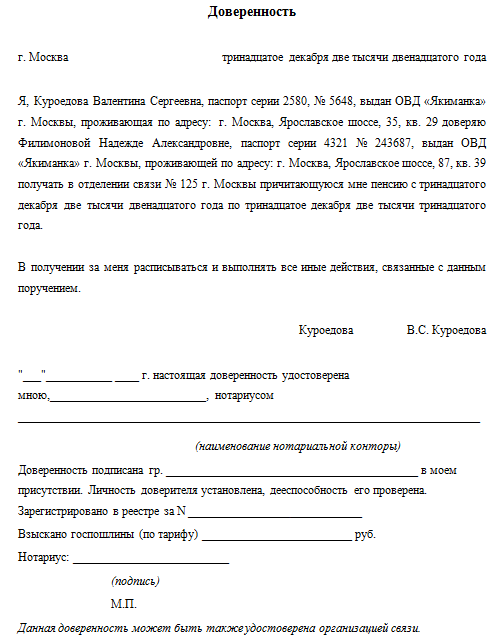
The rights and responsibilities of the principal include:
- the right to vest a representative with a list of powers;
- the right to revoke a document at any time, i.e., to annul its provisions;
- the right to disagree with the candidacy selected by an authorized representative acting as a proxy;
- the obligation to draw up a power of attorney and issue it to the authorized person;
- the obligation to cover the financial costs of the representative or initially to provide a certain amount of money to fulfill the order;
- the obligation to accept everything received during the implementation of the agreement from the trustee - documents, funds, etc.;
- the obligation to pay remuneration if the concluded agreement is for a fee.
We invite you to familiarize yourself with: Sample power of attorney to receive medications
Is the power of attorney from the organization stamped?
Companies and institutions have the right to grant powers under the following circumstances:
- to receive salaries, bonuses and other payments for work activities;
- for the issuance of rewards for inventions, payment of pensions, scholarships, bank deposits;
- acceptance of correspondence (registered letters, parcels, parcels, money transfers at Russian Post offices).
They are provided at the place of work, study, treatment, residence, banks, housing offices. They are certified by the seal of the institution that issued the document and do not imply the approval of the representative.
Legal entities draw up them to carry out any transactions. As a rule, for several persons at the same time, for example, when purchasing goods or receiving mail. The document can be issued to a citizen who does not work in this organization.
The only thing that cannot be trusted to representatives is to pay taxes from the company. If a lot of such papers are prepared, a logbook is created.
We invite you to read: Vacation of teaching staff
Durable power of attorney
This power of attorney is issued to individual entrepreneurs to carry out their activities.
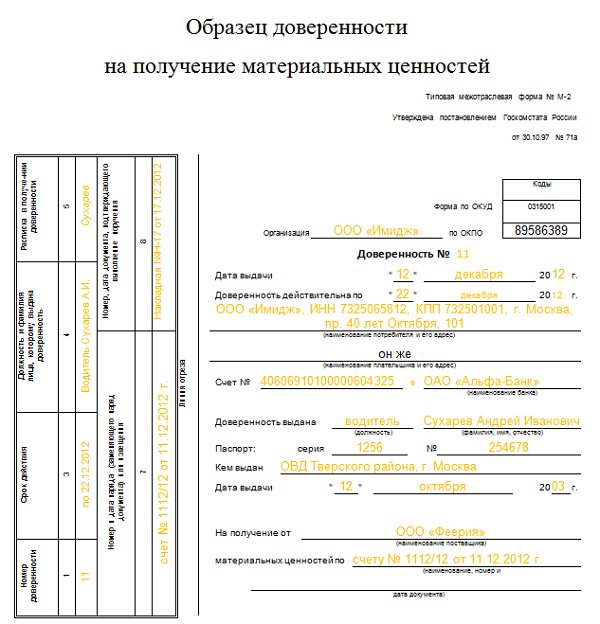
It is impossible to transfer powers to another person, and this is stipulated in the document.
There are reasons for rejection:
- termination of obligations by the principal;
- excess of rights by a representative;
- expiration of a certain paper.
An irrevocable power of attorney specifies the terms of revocation and the period, which are certified by a notary.
What types of powers of attorney are there?
There are several types:
- Special. In order to carry out actions of this kind for some time. This type is used in court cases.
- One-time. It is used when drawing up contracts, purchasing and exchanging real estate, selling or buying a vehicle.
- General. For the disposal of property and the execution of various types of transactions: registration on bail, sale. Provided for a long term if the principal is absent or lives elsewhere.
Please note: if you need to formalize a transaction of this type, it is better to obtain a general power of attorney, because the range of its powers is quite wide.
Parties of the power of attorney
The parties to the power of attorney are the principal (“represented”) and the authorized person (“representative”, “attorney”).
The principal is both an individual and a legal entity who transfers and formalizes part of his powers and duties to an outsider for the latter to carry out legally significant manipulations. A representative is a citizen who acts in the interests of the principal and replaces him in various procedures. This person must be an adult and have legal capacity.
A trusted person is most often a close relative (parents, spouse, children), friend, work colleague or a complete stranger. It is also not prohibited to issue a power of attorney to a foreign citizen.
The parties to the power of attorney are bound by a bilaterally binding agreement, therefore the participants are endowed with rights and responsibilities in relation to each other.
Characteristics of the power of attorney and civil law
A power of attorney is recognized as a written authority issued by one person to another person or other persons for representation before third parties (clause 1 of Article 185 of the Civil Code of the Russian Federation).
The basis for issuing a power of attorney are contracts that define the internal relations between the representative and the represented (employment contract, agency agreement, etc.).
From a legal point of view, a power of attorney is a unilateral transaction indicating the powers of a representative. The rules applicable to a unilateral transaction apply to a power of attorney, but special rules apply.
The rules of the Civil Code of the Russian Federation for powers of attorney also apply in cases where the powers of the representative are contained in an agreement, including in an agreement between the representative and the represented, between the represented and a third party, or in a decision of the meeting, unless otherwise established by law or does not contradict the essence of the relationship (clause 4 Article 185 of the Civil Code of the Russian Federation).
A power of attorney can be issued either directly to a citizen or to a legal entity. However, the powers of a legal entity specified in the power of attorney must be limited to the scope of its special legal capacity. Otherwise, the power of attorney is invalid (Article 168, 173, Part 1 of the Civil Code of the Russian Federation).
Based on the concept, the following features of a power of attorney can be distinguished:
- Firstly, a written form is required for a power of attorney. Depending on who the Principal is and the cases in which it will be necessary to present a power of attorney, it will be necessary to notarize the power of attorney.
- Secondly, the Power of Attorney is a one-sided transaction, since the Principal gives the person certain powers to perform the necessary actions;
- Thirdly, the Power of Attorney is an urgent document (Article 186 of the Civil Code of the Russian Federation). If the power of attorney does not indicate its validity period, it remains valid for a year from the date of its execution. A power of attorney that does not indicate the date of its execution is void;
- Fourthly, the Power of Attorney has two sides, these are: the principal (the person who authorizes) and the authorized person (representative; the person to whom the powers are transferred).
Invalidation of the power of attorney
The law provides for conditions when an agreement between the principal and the attorney should be considered annulled. We are talking not only about the official revocation of the document, but also about other circumstances that change the validity period of the guarantee. An agreement to represent the interests of an individual is considered invalid if:
- the principal dies, goes missing, or is declared partially or completely incompetent;
- the agreement has officially expired;
- the order specified in the document was carried out;
- the attorney refused to accept the agreement;
- the person for whom the order was issued died;
- the organization that was listed as the trustee was liquidated.

Cost of notarization of a power of attorney from an individual
Citizens will have to visit a law office to confirm the authenticity of the document. The power of attorney is certified in the presence of the individual whose interests it will represent. The minimum cost of this service in Moscow is 200 rubles. According to the law, the need for notarized confirmation of the authenticity of a document arises if a real estate or financial transaction is planned. The cost of certification of a power of attorney in well-known law firms in Moscow:
| Name of company | Service price in rubles |
| Notary office on Strastnoy Boulevard | 1200 |
| Notary office of Yuldasheva T.V. | 200 – notary fee, 2200 – when performing legal and technical work |
| Notary Baranova Olga Nikolaevna | 1200 for third-party individuals, 800 for relatives |
| Notary Samokhodkina I.I. | 1200 |
| Notary office and translation agency on Okskaya | 1200 |
Documents to be drawn up
The following documents must be provided to the notary (from the author and from the recipient of the power of attorney):
- passports;
- TIN certificates;
- SNILS.
Depending on the scope of the delegation of rights, the need for the number and composition of papers is different; the principal can indicate bank details, details of title documents for real estate and movable property, and other things that need to be supported by the provision of relevant papers.
The notary must always emphasize that he gives his client the contents of Art. 185 of the Civil Code of the Russian Federation explained.
When is representation not possible?
The law determines that representation is not possible in all cases. Based on the analysis of current regulations and judicial practice, we can come to the conclusion that representation is excluded in the following cases:
- marriage - the spouses are required to personally confirm their consent to the marriage, about which a corresponding entry is made in the registration journal;
- divorce through the registry office - at least 1 of the spouses must personally apply for divorce, and after some time appear in person for a Divorce Certificate;
- registration of a will – art. 1118 Civil Code of the Russian Federation;
- adoption of a child - a citizen of the Russian Federation.
However, a direct ban cannot be considered as an irreversible postulate. The fact is that in a number of cases the participation of a representative (trustee) is not limited by law. For example, in adoption cases, an attorney may be given the right to represent the interests of the person being represented and to be present at commission meetings, in the courtroom, etc. It is another matter that the absence of a person interested in resolving a specific issue is excluded.
The “ban” on contacting an attorney during divorce proceedings through the court is just as easily circumvented. Representation of interests in court allows the represented person to ignore court hearings. As long as his interests are defended by an experienced lawyer, then there is no point for the interested party to interfere in the process. The judge will not insist on the personal presence of the spouse - a party to the process.
The result of Natalia M.’s intra-family conflict was divorce. However, due to property claims, the couple could not divorce without a trial. The woman did not have the moral strength to independently engage in the divorce process and defend her interests. She turned to lawyers and formalized representation, entrusting the lawyers with the right to defend the property in court.

